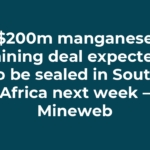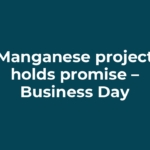Mining ‘no cure’ for poverty – Mining Mx
THE John Taolo Gaetsewe District Municipality in the Northern Cape hosts more than 75% of the world’s manganese reserves as well as Kumba Iron Ore’s Sishen mine – the biggest open cast iron ore operation.
The area – which includes the towns of Kuruman, Kathu and Hotazel – is also one of the nine nodes of poverty in South Africa, and anyone who looks for an example where mining flourishes amid widespread squalor will find it here.
Yet, miners will argue they are doing more than their fair share for upliftment. Kumba alone spent R72 on community projects during its previous financial year, while around R2.3bn will be paid out to employees in November when a five-year empowerment scheme matures.
In one of the latest mining developments in the area, former anti-apartheid activist turned businessman Saki Macozoma on Wednesday presided over the sod turning ceremony of mining newcomer Tshipi é Ntle’s Borwa mine – a R1.7bn development where the company aims to mine 2.4 million tonnes of manganese ore per year for the next 60 years.
Macozoma serves as chairperson, with empowerment group Ntsimbintle owning 50.1% of the shares, and mining veteran Brian Gilbertson’s Pallinghurst Resources holding the remaining 49.9% via Australian-listed Jupiter Mines.
Macozoma said the notion that mining alone could solve poverty was deeply flawed. “Mines had a terrible reputation for not investing in the areas around their operations and leaving ghost towns behind when they’ve finished mining, but the new dispensation (The Minerals and Petroleum Resources Development Act) has addressed a lot of this,” Macozoma said.
He said it was easy for “propagandists” to draw comparisons between sky-high commodity prices and poverty in surrounding areas to argue a case of exploitation, but that such a notion did not take into account the taxes and royalties which miners contribute to the national fiscus. Apart from these, the MPRDA compels companies to invest heavily in social and labour plans.
“The state already benefits a lot from mining without having to sink a single shaft,” he said. “Mining alone could not solve poverty.”
Asked whether new miners like Tshipi é Ntle shouldn’t be pro-active on beneficiation – the group would export all its ore as unprocessed product – Macozoma said the security of electricity supply and clarity on the costs thereof are prerequisites for large-scale beneficiation.
“I associate with the view that we shouldn’t simply be digging and shipping our minerals, but beneficiation also has to make economic sense,” he said. Still, he acknowledges that miners in future may be hard-pressed to beneficiate as a concession in a climate where nationalisation has become part of the national discourse.
“You can make compromises, but there is always a danger that you would become unviable,” he said. “Investors have many options of where to go; and they’ll go where they’ll find the best return for what they put in.”
Macozoma said the core of Tshipi é Ntle’s upliftment programmes would be run and funded by the John Taolo Gaetsewe Development Trust, which holds a 15% stake in Ntsimbintle.
Said Omphemetse Magodi, chairperson of the trust: “I think what Tshipi has done is a bit different, because (through the shareholding) the money they invest in the community will be related to their profits,” she said. “The shareholding will give people a sense that they too own the mine.”
Ebrahim Takolia, executive head of mining at Deloitte Consulting, agrees it will make most sense to focus first on less energy intensive activities like diamond polishing and autocatalyst converters.
“When people think of beneficiation they only think of big plants,” Takolia said. “The bigger issue is what would compel people to do things here; and whether there will be enough incentives.”

